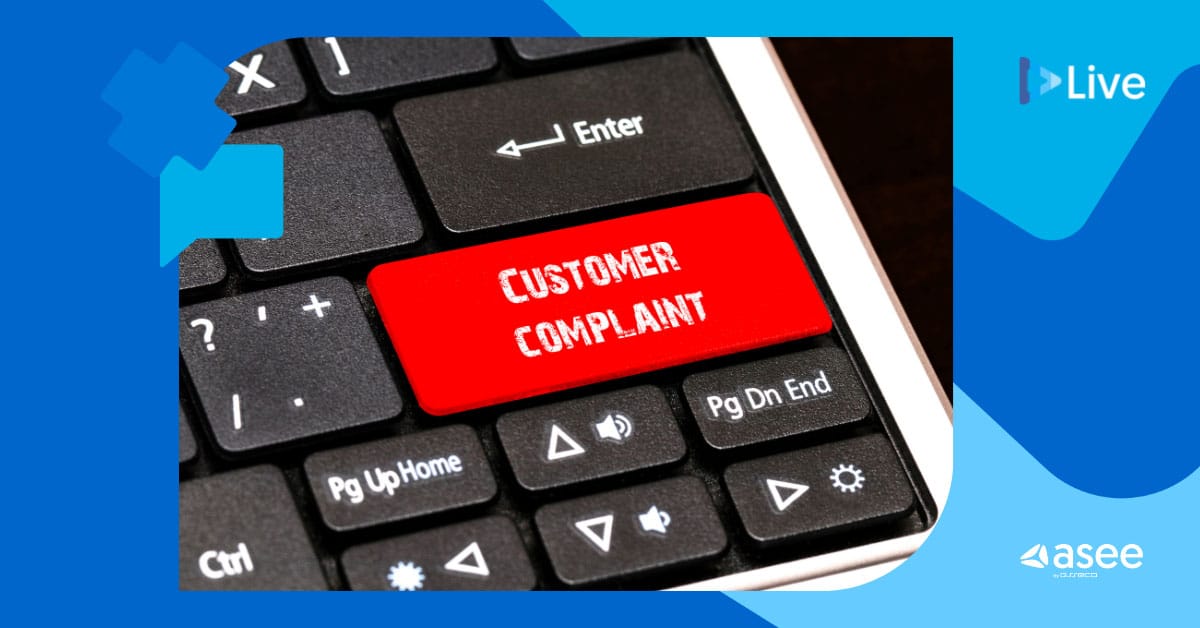
Customer complaints aren’t just problems — they’re insights. Whether the issue stems from a service gap or mismatched expectations, your response shapes the customer experience and your brand’s reputation. Even when you’re not at fault, resolving the issue promptly and professionally can help retain loyalty and strengthen trust.
According to the Qualtrics XM Institute, customers who rate a company's service as "good" are 38% more likely to recommend it. That makes an effective complaint management process not just helpful, but essential.
With a reliable customer complaint processing solution like Live by ASEE, organizations can streamline complaint handling, ensure consistency, and meet customer expectations and regulatory standards.
Here is an overview of the steps in such a process based on best practices for handling customer complaints.
When a customer reaches out with a complaint, active listening is the first and most important step. Stop what you're doing, focus completely on the customer, and show empathy. Let them explain the issue without interruption.
Take detailed notes to ensure clarity and to create a record for follow-up. Active listening helps defuse tension, shows that you value the customer, and sets a positive tone for resolution.
Work together with the customer to find a fair and feasible resolution. While listening, pay attention to what the customer wants and identify how to resolve and prevent the issue.
Ask guiding questions like:
Avoid redirecting the issue to other departments. Empower front-line staff to solve problems directly, which increases first-contact resolution rates and boosts satisfaction. Ensure employees understand company policies and know what solutions they can offer confidently and honestly.
Ultimately, resolving complaints quickly and effectively with empowered, well-informed staff not only prevents recurring issues but also strengthens customer trust and loyalty. By following customer service best practices and prioritizing thoughtful solutions, organizations address concerns more efficiently, gain valuable insights into how to improve customer experience, and turn challenges into opportunities to grow.

Every customer has a unique communication style. Some are vocal about their concerns, while others quietly leave. Some customers reach out frequently with minor issues, while others only raise concerns when necessary.
Adapting your approach based on the customer type can make interactions more productive:
Understanding customer behavior helps tailor your tone and messaging, improving resolution outcomes.
Timeliness is key. According to Statista, 27% of customers cite a lack of effectiveness as a top frustration, and 12% say delays are the issue.
Once a resolution is agreed upon, act quickly. Ideally, resolve the issue immediately or provide a clear timeline. If the fix requires time, keep the customer updated at each stage. Communicate progress and confirm when the problem is fully resolved.
Live by ASEE supports fast response times while helping organizations comply with internal and external regulations.
Even after resolving the complaint, your work isn't done. Follow up within a few days to ensure the customer is satisfied and that the solution worked. This extra step shows a commitment to service excellence.
Also, thank the customer for their feedback. Let them know their input is valued and that it helps improve your service. A simple thank-you can turn a previously dissatisfied customer into a loyal advocate.
Effectively handling customer complaints requires empathy, speed, and structure. By following these five proven steps, your business can transform complaints into opportunities for growth.
At Live by ASEE, we provide a complete solution for managing customer feedback and complaints. From first contact to resolution and follow-up, our tools help you exceed expectations and build lasting customer relationships.
Ready to elevate your customer service? Contact us today and discover how Live can turn complaints into long-term loyalty.